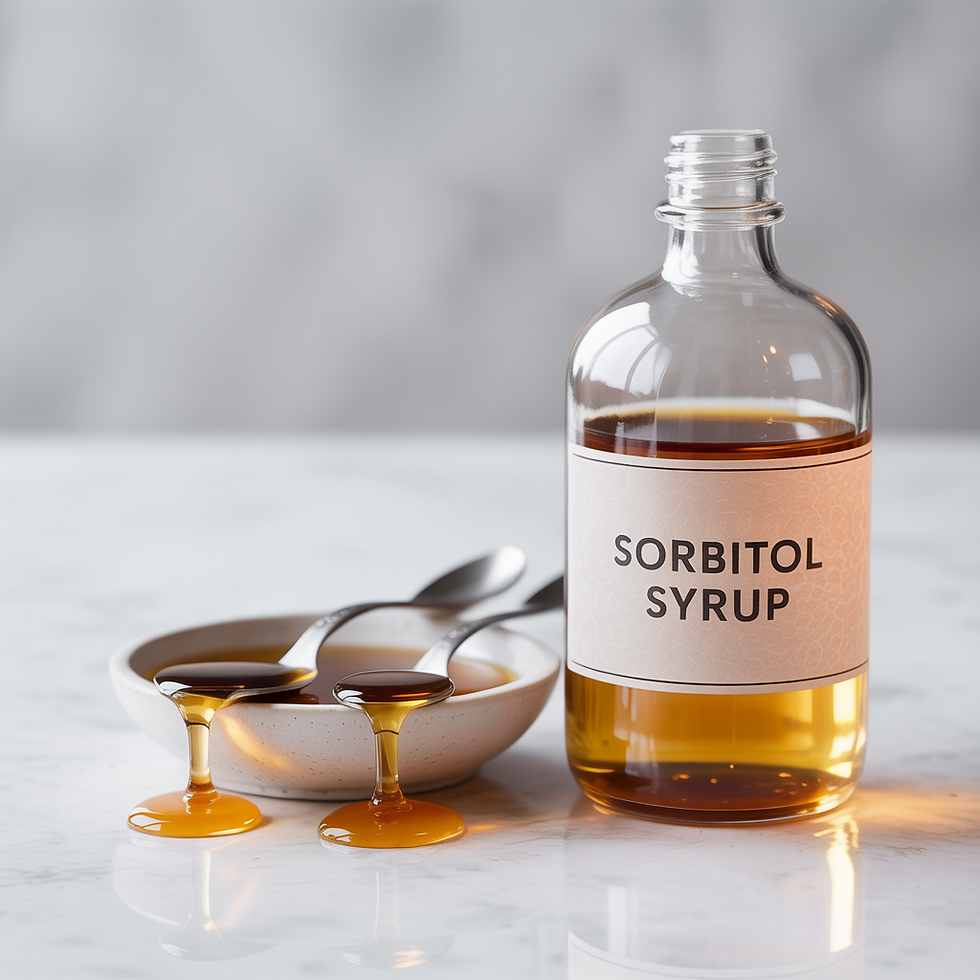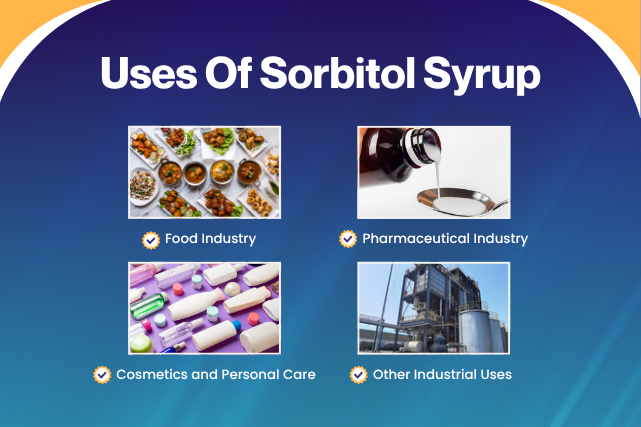What is Sorbitol Syrup and How is It Used?
- sudevinternational

- May 30, 2025
- 4 min read
Updated: Dec 2, 2025

If you’ve ever looked closely at the ingredients in sugar-free candies, chewing gum, or even certain medicines, you might have come across the term sorbitol syrup. But what exactly is sorbitol syrup and why is it so widely used across different industries? In this blog, we will explain what sorbitol syrup is, how it’s made, and the many ways it’s used in food, pharmaceuticals, cosmetics, and more.
At Sudev International, we specialize in providing high-quality sorbitol syrup that meets the needs of manufacturers and producers worldwide. Whether you’re a food processor, pharmaceutical company, or cosmetic manufacturer, understanding sorbitol syrup can help you make better products.
What is Sorbitol Syrup?
Sorbitol syrup is a thick, sweet liquid made from sorbitol, a type of sugar alcohol. Sorbitol occurs naturally in some fruits such as apples, pears, and peaches. However, the sorbitol syrup used in most products is made industrially from glucose.
Compared to regular sugar, sorbitol syrup contains fewer calories and does not cause rapid spikes in blood sugar levels. Because of this, it is often used as a sweetener in sugar-free and low-calorie foods.
Sorbitol syrup is clear and colorless with a mild sweetness that blends well into many products. Its syrup form makes it easy to mix into food, medicines, and cosmetic formulas.
How is Sorbitol Syrup Made?
Sorbitol syrup is made through a process called hydrogenation. This means glucose derived from starch sources like corn or tapioca is chemically changed into sorbitol by adding hydrogen.
After the reaction, the syrup is purified and concentrated to create the final clear, thick liquid we know as sorbitol syrup.
At Sudev International, we follow strict quality control standards to ensure our sorbitol syrup is pure, consistent, and safe for a wide variety of uses.
Key Properties of Sorbitol Syrup
Sorbitol syrup has several important properties that make it valuable in many industries:
Sweetness: About 60 percent as sweet as regular sugar, offering a mild and pleasant taste without overpowering flavors.
Low Calories: Contains fewer calories than table sugar, making it ideal for diet-friendly and sugar-free products.
Humectant: It attracts and holds moisture, helping products stay fresh and soft for longer.
Non-cariogenic: Does not cause tooth decay, making it better for dental health compared to sugar.
Stable: Remains stable under heat and during storage, which makes it reliable for cooking and manufacturing.
Uses of Sorbitol Syrup

Food Industry
Sorbitol syrup is widely used in the food industry for many reasons:
As a sugar substitute in sugar-free candies, chewing gums, baked goods, chocolates, and ice creams.
As a moisture retainer, it helps keep baked goods and sweets soft and fresh.
To improve texture by providing smoothness and bulk.
To reduce calories in products aimed at health-conscious consumers.
Pharmaceutical Industry
Sorbitol syrup also plays an important role in pharmaceuticals:
It is used as a sweetener in liquid medicines to mask unpleasant tastes.
It acts as a moisturizer and stabilizer, maintaining the texture and consistency of tablets and liquids.
Due to its natural laxative effect, it is included in some constipation-relief medicines.
Cosmetics and Personal Care
In cosmetics, sorbitol syrup is appreciated for its moisturizing qualities:
It keeps lotions, creams, and gels hydrated by retaining moisture.
It is used in toothpaste and mouthwash to provide sweetness without causing cavities.
It helps maintain moisture and improve texture in shampoos and conditioners.
Other Industrial Uses
Sorbitol syrup is also used in plastics and textiles, where it acts as a plasticizer or stabilizer to improve product performance.
Advantages of Sorbitol Syrup
Using sorbitol syrup offers many benefits:
It is a healthier alternative to sugar for people with diabetes or those on calorie-restricted diets.
It does not promote tooth decay.
It improves product texture and shelf life by retaining moisture.
It remains stable during heat processing and storage.
It is generally recognized as safe when used properly.
Potential Side Effects and Considerations
Sorbitol syrup is safe for most people, but consuming large amounts may cause digestive discomfort like bloating, gas, or diarrhea. This happens because sorbitol is not fully absorbed in the intestines and may ferment.
People with sensitive digestion or conditions such as irritable bowel syndrome (IBS) should monitor their intake of sorbitol-containing products.
Why Choose Sudev International for Sorbitol Syrup?
At Sudev International, we provide premium sorbitol syrup made using advanced technology and strict quality control. Our syrup is:
Pure and consistent to meet your manufacturing needs
Available in different grades for various applications
Supported by expert advice to help you optimize your products
Delivered reliably to food, pharmaceutical, cosmetic, and industrial clients worldwide
We are committed to helping your business improve with quality ingredients.
Final Thoughts
Sorbitol syrup is a versatile and valuable ingredient combining sweetness, moisture retention, and safety. It is widely used in sugar-free foods, medicines, and personal care products. Its benefits make it a key choice for manufacturers aiming to create healthier, better-performing products.
If you want to source high-quality sorbitol syrup for your business, Sudev International is the trusted partner you can rely on. Contact us today to learn more about our products and how they can fit your needs.
FAQs - Sorbitol Syrup
What is sorbitol syrup made from?
Sorbitol syrup is typically made by hydrogenating glucose, which is derived from starch sources like corn or tapioca.
Is sorbitol syrup safe for people with diabetes?
Yes, sorbitol syrup has a low glycemic index and does not spike blood sugar levels quickly, making it a common sugar substitute in diabetic-friendly products.
What are the main uses of sorbitol syrup in food?
Sorbitol syrup is used as a sweetener in sugar-free candies, chewing gum, baked goods, and low-calorie snacks. It also helps retain moisture in food products.
Can sorbitol syrup cause digestive issues?
Consuming large amounts of sorbitol syrup may cause bloating, gas, or diarrhea, especially in people with sensitive digestion or IBS.
How is sorbitol syrup used in pharmaceuticals?
It’s used as a sweetener in liquid medicines, to improve taste and texture, and as an ingredient in some laxatives due to its mild laxative effect.
Is sorbitol syrup used in cosmetics?
Yes, it helps retain moisture in skincare products, improves texture in shampoos and lotions, and adds sweetness to oral care items like toothpaste.

